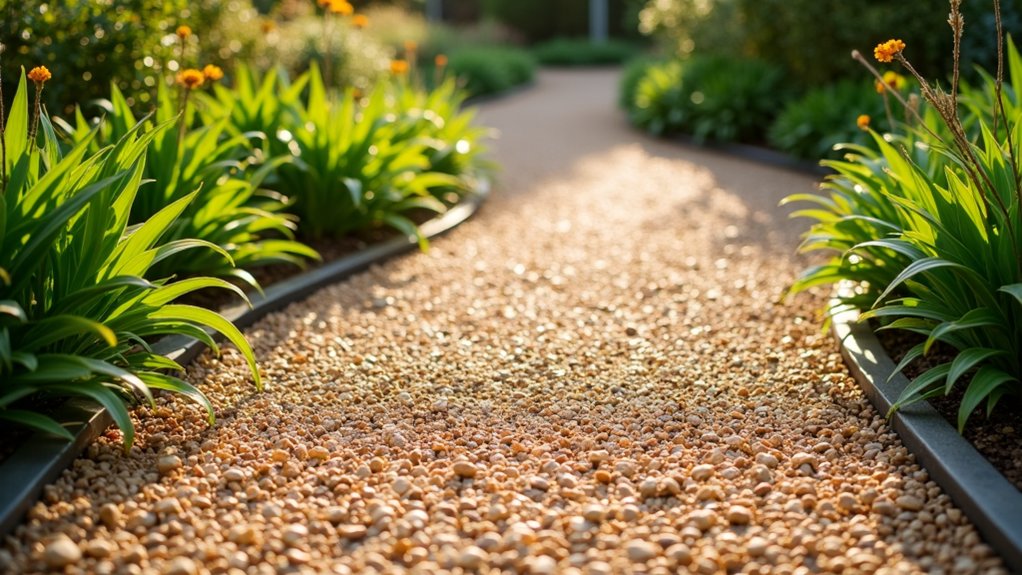Resin-bound gravel makes an excellent choice for garden paths, delivering robust durability for 15-30 years when properly laid. The range of colours and textures means you can match your path perfectly with your garden design. Its grip-friendly surface works brilliantly in wet British weather, whilst proper drainage keeps puddles at bay. Being sourced from UK quarries, it’s an environmentally sound choice that supports British industry and cuts transport emissions.
Key Takeaways
Perfect for Garden Paths: The Benefits of Resin-Bound Gravel
- Built to last 15-25 years, with premium options reaching 30 years – about the same lifespan as your average garden shed.
- Non-slip surface gives excellent grip, even during Britain’s notorious wet weather.
- Pick from countless colours and designs to match your garden, whether you’ve got a sleek modern space or a cottage-style setup.
- Naturally drains rainwater, unlike concrete paths that create puddles – brilliant for our rainy climate and environmentally sound.
- Good value for money at £8-£13 per square metre, roughly the cost of quality paving slabs but with better longevity.
Durability and Longevity of Resin-Bound Gravel
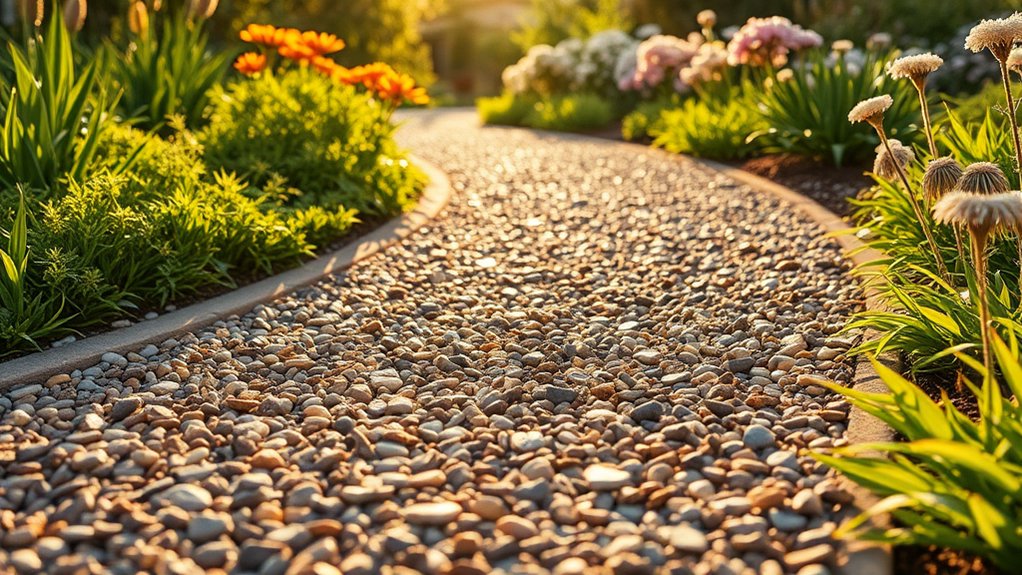
Resin-bound gravel paths offer exceptional longevity when properly installed. Most surfaces last 15-25 years, whilst premium compounds can extend this to 30 years. Professional installation is crucial – much like laying a proper foundation for a house, the correct base preparation and resin mix ensure your path won’t crack or shift over time. Additionally, the average lifespan of these surfaces is influenced by factors such as material quality and installation skill. It’s important to note that UV-resistant materials are advisable for enhancing durability, especially in areas with significant sunlight exposure.
Think of maintenance like caring for your car – regular checks and cleaning keep things running smoothly. A good clean and reseal every 3-5 years will keep your path in top condition. Tackle any weeds or algae straight away, as these can compromise the surface’s strength.
Whilst the initial cost might be higher than traditional gravel, the durability makes it a sound investment for British gardens, particularly given our varied weather conditions. With proper care, your resin-bound path will remain stable and attractive for decades.
Aesthetic Versatility and Design Options
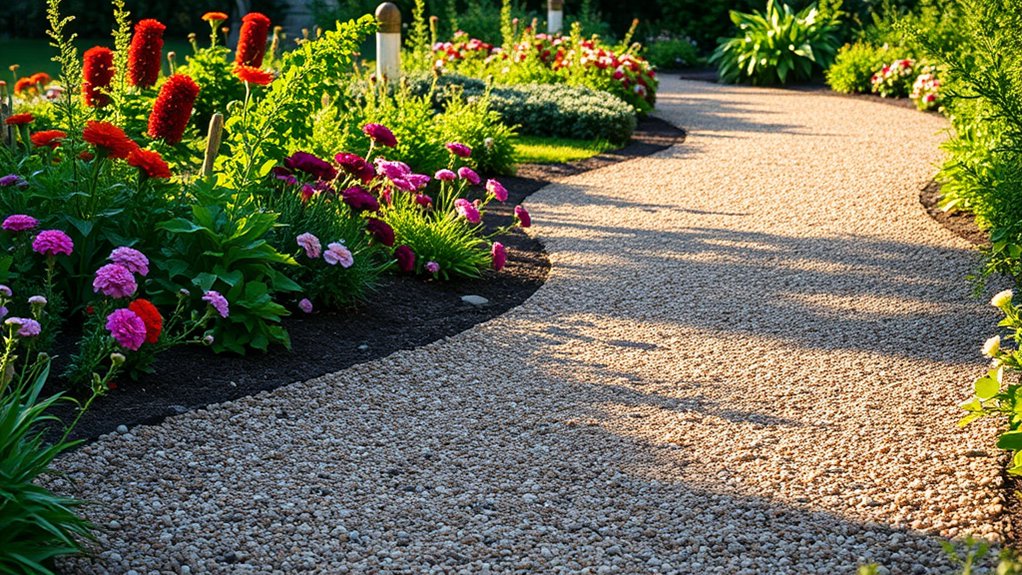
Resin-bound gravel comes in countless colours and finishes, making it brilliant for customising garden paths. You can create bespoke patterns or add personal touches like your house number, all whilst maintaining a smart, cohesive look. Additionally, its eco-friendly options allow for sustainable choices in your garden design. The system works particularly well with British gardens, whether you’re going for a modern or traditional style. Additionally, its durability and longevity ensure that your garden paths will last for years to come without significant maintenance needs. Mix and match colours to complement your existing paving or house bricks – from warm honey tones to classic grey blends.
Color and Texture Variety
The colour and texture options for resin-bound gravel offer plenty of choice for garden paths.
The range includes:
- Natural stone shades – warm ambers and honey tones
- Smart greys and blacks – from light charcoal to deep slate
- Clean whites and pale stones
- Rich browns – including warm sienna and terracotta
- Distinctive blended mixes
Surface textures can be smooth for a modern look or rougher for a more natural feel. Earthy tones inspired by natural stone create a rustic appeal that enhances the overall aesthetic of your garden. Different-sized stones work together to create varied finishes, letting you match your path perfectly to your garden’s style. Additionally, the Daltex range provides a plethora of unique color combinations to suit any design preference.
Most local suppliers stock a good selection of colours and grades to choose from.
Customization and Patterns
Resin-bound gravel paths offer excellent scope for personalisation, allowing you to create distinctive designs that complement your garden or driveway.
You can craft striking patterns using geometric shapes and contrasting borders, whilst different aggregate colours open up countless design possibilities. Fancy having your house number set into the path? It’s entirely doable.
Whether you’re after simple elegance or bold contemporary looks, the options are vast. Mix different aggregates for eye-catching effects, or incorporate decorative stones to add visual interest.
From traditional herringbone to modern circular patterns, resin-bound gravel transforms ordinary paths into bespoke features that set your property apart.
Safety Features of Resin Pathways
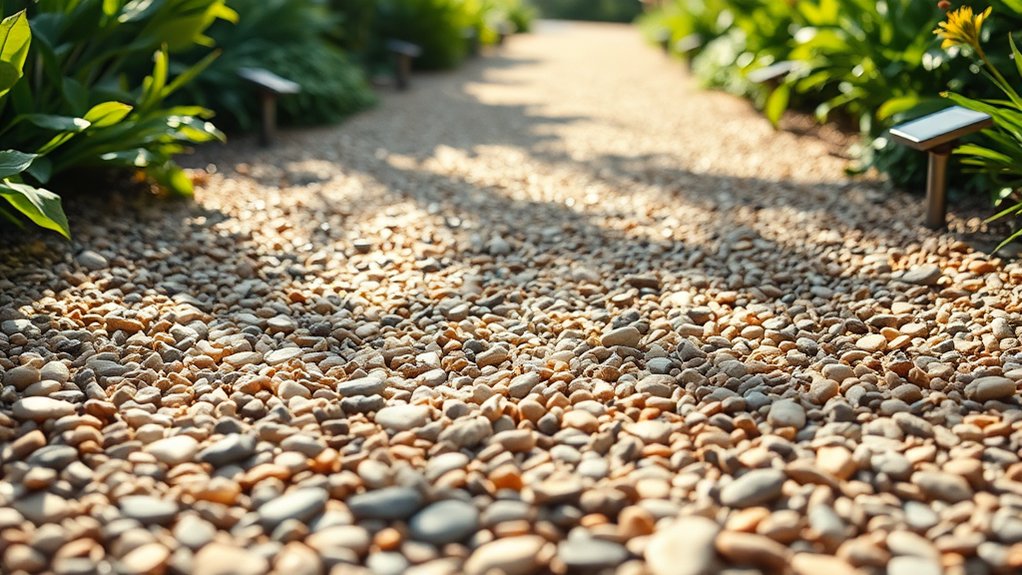
Resin Pathways: Safety Benefits
Resin pathways pack impressive safety features whilst looking smart in your garden. Built to UK safety standards, they’re a practical choice for paths that need to be safe year-round.
Key safety features:
- Non-slip surface prevents trips and slips
- Stone aggregate gives extra grip in wet weather
- Water drains through easily, stopping puddles
- No joins or gaps to catch feet or wheels
- Stays cleaner than standard paving, reducing moss build-up
These paths work brilliantly for family gardens, care homes and public spaces where safety matters most.
The combination of good looks and safety makes them worth considering over traditional paving or gravel.
Environmental Benefits of Resin-Bound Gravel
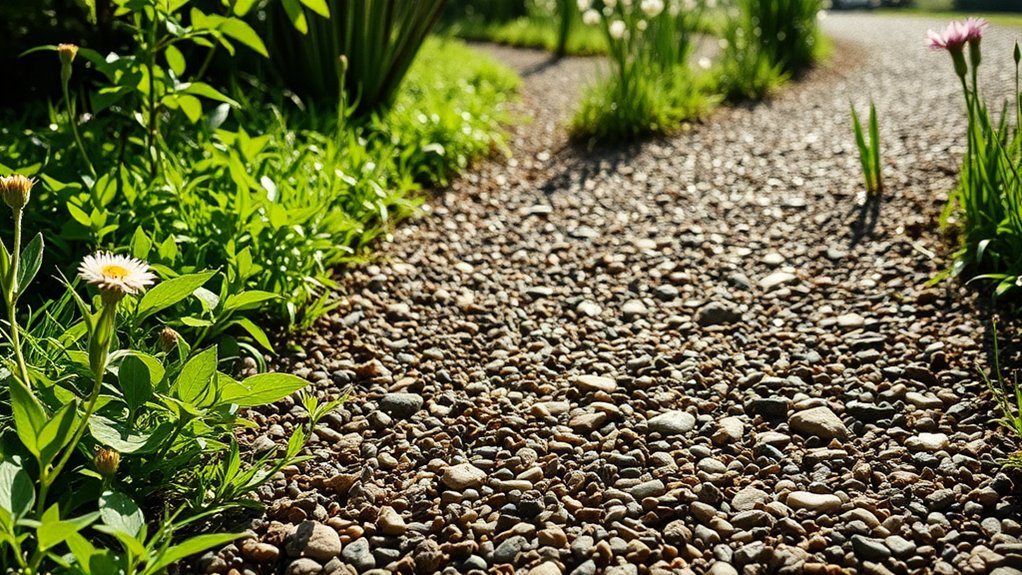
Resin-bound gravel offers significant green benefits for UK gardens and driveways. The material’s porous nature lets rainwater drain naturally through to the soil, much like a natural surface would. This helps manage rainfall effectively, particularly during Britain’s notorious wet seasons, and reduces localised flooding.
Think of it as a giant filter – the system naturally cleanses rainwater before it reaches our streams and rivers, cutting down on pollution.
Unlike traditional concrete or tarmac, resin-bound surfaces don’t overload local drainage systems when it pours. The gravel used comes from natural sources, often local quarries, which cuts down on transport emissions and supports British industry.
It’s remarkably durable too – a properly installed resin-bound path or driveway can last 15-20 years with minimal upkeep, making it a sustainable choice for UK homes.
Cost-Effectiveness and Ease of Installation
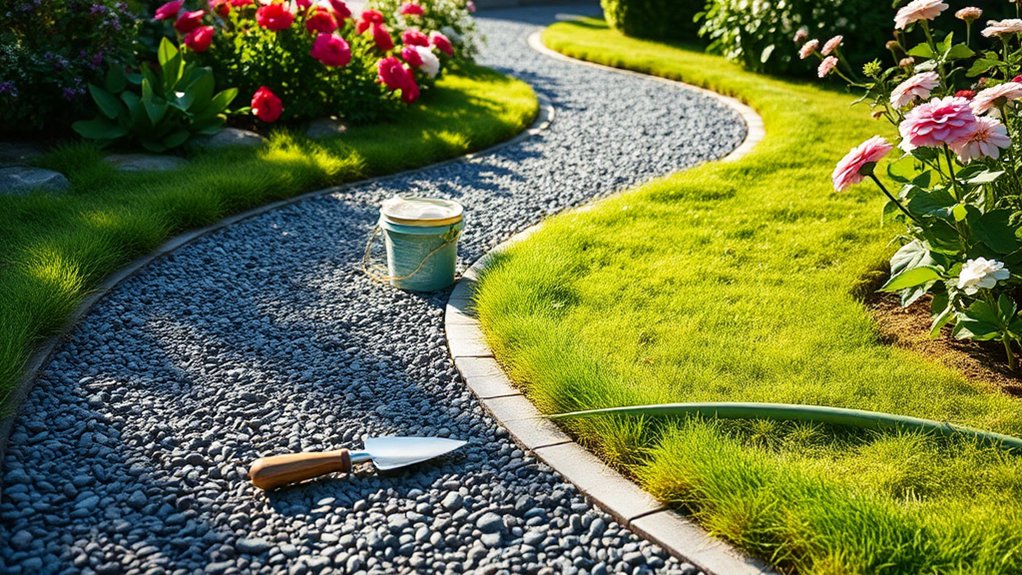
Cost-Effectiveness and Installation Made Simple
Resin-bound gravel offers excellent value and straightforward installation for garden paths and driveways. Installation costs typically range from £8 to £13 per square metre, making it a competitive option amongst modern surfacing solutions.
The process is relatively quick, particularly when the base is properly prepared.
- Low ongoing maintenance costs
- Quicker to install than traditional paving
- DIY options suitable for small areas
- UV-resistant materials maintain colour
- Professional fitting ensures lasting quality
The realistic installation time for an average driveway (roughly 50 square metres) is typically one to two days, weather permitting.
Comparison With Other Paving Materials
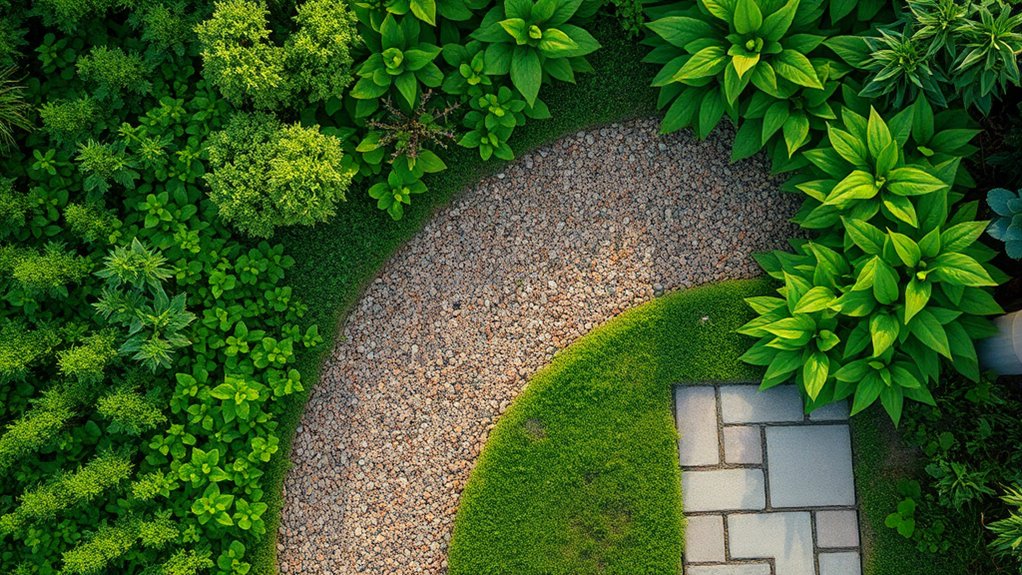
Resin-bound gravel offers distinct benefits compared to traditional paving options.
Unlike block paving, it prevents water pooling and needs less upkeep, though it costs more initially.
Whilst concrete handles heavy vehicles better, it lacks resin’s modern look and adaptability.
Standard gravel comes cheaper but scatters easily and needs regular maintenance – picture constantly raking loose stones back into place.
The permeable nature of resin-bound surfaces helps manage rainfall effectively, meeting UK sustainability requirements for driveways and paths.
For most British gardens and driveways, resin-bound gravel strikes an ideal balance between practicality and kerb appeal.
Frequently Asked Questions
How Long Does Resin-Bound Gravel Typically Last?
Resin-bound gravel surfaces last between 15 and 25 years when properly installed and maintained. Much like a garden patio, these driveways need regular upkeep to reach their full lifespan. Key maintenance includes brushing away debris, prompt cleaning of oil spills, and resealing every 3-5 years – similar to treating a wooden deck. With proper care, a resin-bound surface can withstand decades of British weather and daily vehicle use.
Is Resin-Bound Gravel Suitable for Driveways as Well?
Resin-bound gravel makes an excellent choice for driveways across the UK, with the durability to handle daily car use and British weather conditions. Think of it as a smart alternative to traditional tarmac or block paving – it’s both practical and smart-looking. Just ensure you hire a qualified installer, as proper laying techniques are crucial for withstanding vehicle weight and avoiding unsightly dips or cracks.
Can I Install Resin-Bound Gravel Myself?
Whilst resin-bound gravel can be installed as a DIY project, it requires careful attention to detail and proper tools. Essential equipment includes a forced action mixer, steel trowels and a power float. The key to success lies in thorough base preparation and precise mixing of the resin with aggregate. Bear in mind that mistakes can be costly and permanent, so if you’re not confident with large-scale outdoor projects, it’s worth considering professional installation.
What Preparation Is Needed Before Installation?
Before installation, carry out a proper site survey. Check that your base is solid and well-compacted – think of it like preparing soil for a garden patio. Sort out any drainage issues, remove all debris, and pay special attention to the edges and sub-base. A well-prepped surface ensures your resin-bound gravel will last longer and look better.
How Does Weather Affect Resin-Bound Gravel?
Resin-bound gravel delivers exceptional weather resistance, typically lasting up to 25 years in British conditions. Much like our roadways in winter, freezing temperatures can cause the surface to expand, whilst excess moisture might affect the resin’s grip. Think of it as similar to ice forming in pavement cracks—but regular upkeep, particularly during harsh weather spells, keeps these surfaces tip-top.
Conclusion
Resin-bound gravel proves an excellent choice for garden paths, combining strength and style in equal measure. It works brilliantly in British weather, stays puddle-free and keeps its looks far longer than standard gravel or paving slabs. Unlike loose stones that scatter onto lawns, this surface stays put and needs minimal upkeep – just an occasional sweep and wash. Whilst the initial cost might be higher than traditional materials, its longevity and low maintenance make it a sound investment for any UK garden.
